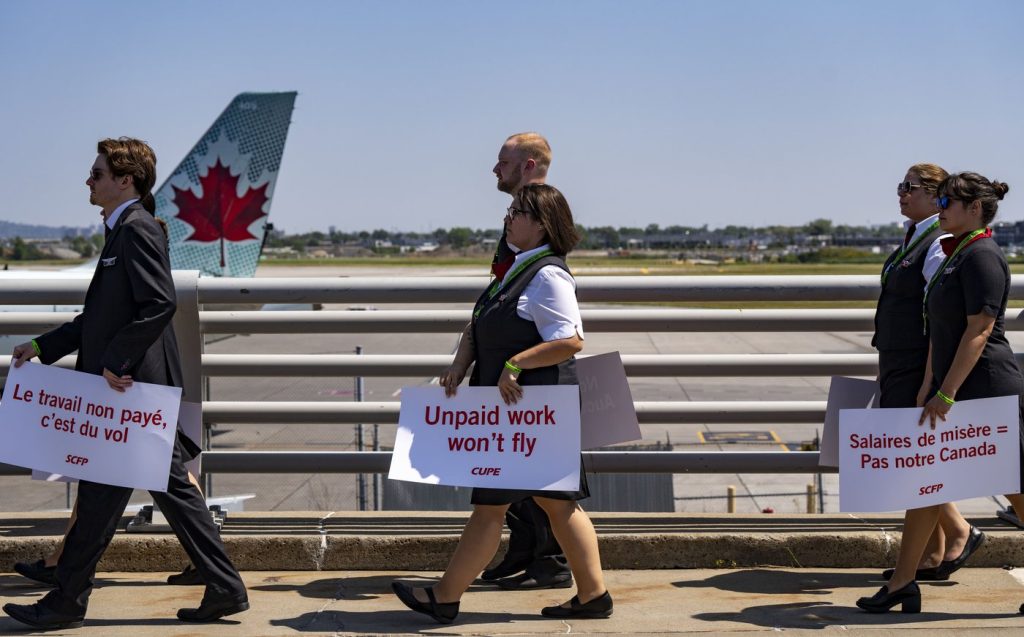Business
Air Canada Strike Could Transform Aviation Sector, Expert Warns

A significant labor dispute involving Air Canada flight attendants could lead to a strike that may reshape the aviation industry across Canada. The ongoing issue of unpaid work is at the heart of negotiations, with experts warning that a work stoppage could have far-reaching implications for the sector.
Ian Lee, an associate professor at Carleton University’s Sprott School of Business, highlighted that the dispute over unpaid duties could prompt substantial changes if the flight attendants decide to strike. He stated on 1130 NewsRadio, “I don’t think there’s very much support anywhere in the country for the idea of working for free.” This sentiment reflects a growing frustration among workers about the expectations placed upon them without corresponding remuneration.
The union representing Air Canada flight attendants has raised concerns that its members are dedicating numerous hours monthly without pay. These unpaid hours include essential tasks such as boarding, deplaning, and conducting safety checks. Lee suggests that this situation could compel the federal government to intervene and consider new regulations making it illegal for airlines to require unpaid work.
Should Ottawa take action, it might involve the Canada Industrial Relations Board ordering workers back to their roles while simultaneously committing to introduce legislative changes to the Labour Standards Act. Lee noted, “They could do something like that,” indicating a legislative response is plausible.
Despite this potential for reform, Lee cautioned that any new regulations would likely apply only to domestic airlines. This limitation could place Canadian carriers at a disadvantage compared to international airlines that are not subject to Canadian laws. “You can only legislate against the domestic airlines,” he explained, emphasizing the need for a level playing field within the industry.
The possibility of a strike looms, with reports indicating that Air Canada may begin cancelling flights as early as Saturday. The flight attendants’ union recently declined an arbitration proposal from the airline, heightening the tension surrounding the ongoing negotiations.
Lee’s analysis suggests that if the federal government does move to prohibit unpaid work in aviation, it could set a significant precedent for other industries to follow. Unlike sectors where off-the-clock responsibilities may be ambiguous, the airline industry presents clear instances of unpaid labor. “If you’re standing up there in the plane — it has come to a stop — and you’re no longer being paid, yet you’re still deplaning customers, I don’t think anybody can say you’re not on the job,” he said.
Historically, the federal government has intervened during strikes in the transportation sector, and Lee believes it is likely that a potential Air Canada strike would not extend beyond a few days before intervention occurs. As negotiations continue, the outcome of this dispute may significantly impact the future of labor practices within Canada’s aviation industry.

-

 Education4 months ago
Education4 months agoBrandon University’s Failed $5 Million Project Sparks Oversight Review
-

 Science5 months ago
Science5 months agoMicrosoft Confirms U.S. Law Overrules Canadian Data Sovereignty
-

 Lifestyle5 months ago
Lifestyle5 months agoWinnipeg Celebrates Culinary Creativity During Le Burger Week 2025
-

 Health5 months ago
Health5 months agoMontreal’s Groupe Marcelle Leads Canadian Cosmetic Industry Growth
-

 Science5 months ago
Science5 months agoTech Innovator Amandipp Singh Transforms Hiring for Disabled
-

 Technology5 months ago
Technology5 months agoDragon Ball: Sparking! Zero Launching on Switch and Switch 2 This November
-

 Education5 months ago
Education5 months agoNew SĆIȺNEW̱ SṮEȽIṮḴEȽ Elementary Opens in Langford for 2025/2026 Year
-

 Education5 months ago
Education5 months agoRed River College Launches New Programs to Address Industry Needs
-

 Business4 months ago
Business4 months agoRocket Lab Reports Strong Q2 2025 Revenue Growth and Future Plans
-

 Technology5 months ago
Technology5 months agoGoogle Pixel 10 Pro Fold Specs Unveiled Ahead of Launch
-

 Top Stories4 weeks ago
Top Stories4 weeks agoCanadiens Eye Elias Pettersson: What It Would Cost to Acquire Him
-

 Technology3 months ago
Technology3 months agoDiscord Faces Serious Security Breach Affecting Millions
-

 Education5 months ago
Education5 months agoAlberta Teachers’ Strike: Potential Impacts on Students and Families
-

 Business1 month ago
Business1 month agoEngineAI Unveils T800 Humanoid Robot, Setting New Industry Standards
-

 Business5 months ago
Business5 months agoBNA Brewing to Open New Bowling Alley in Downtown Penticton
-

 Science5 months ago
Science5 months agoChina’s Wukong Spacesuit Sets New Standard for AI in Space
-

 Lifestyle3 months ago
Lifestyle3 months agoCanadian Author Secures Funding to Write Book Without Financial Strain
-

 Business5 months ago
Business5 months agoNew Estimates Reveal ChatGPT-5 Energy Use Could Soar
-

 Business3 months ago
Business3 months agoHydro-Québec Espionage Trial Exposes Internal Oversight Failures
-

 Business5 months ago
Business5 months agoDawson City Residents Rally Around Buy Canadian Movement
-

 Technology5 months ago
Technology5 months agoFuture Entertainment Launches DDoD with Gameplay Trailer Showcase
-

 Top Stories4 months ago
Top Stories4 months agoBlue Jays Shift José Berríos to Bullpen Ahead of Playoffs
-

 Technology5 months ago
Technology5 months agoWorld of Warcraft Players Buzz Over 19-Quest Bee Challenge
-

 Top Stories3 months ago
Top Stories3 months agoPatrik Laine Struggles to Make Impact for Canadiens Early Season









